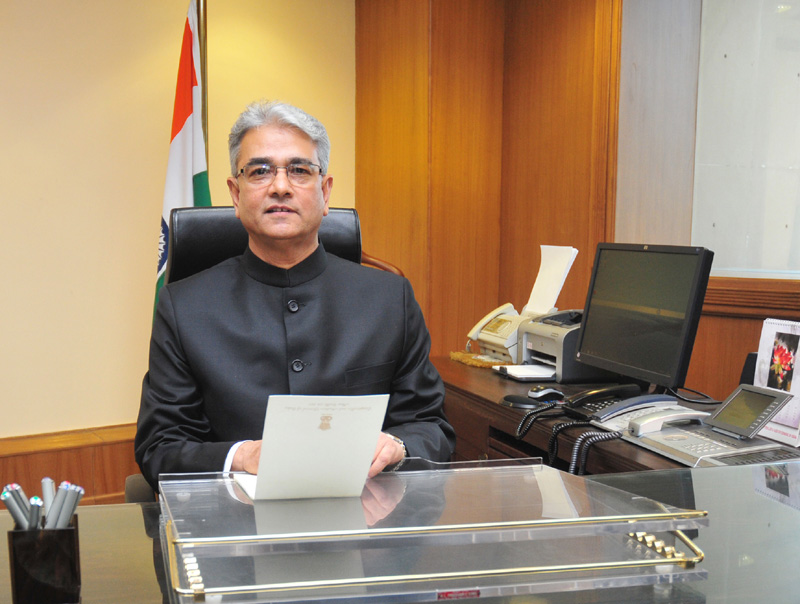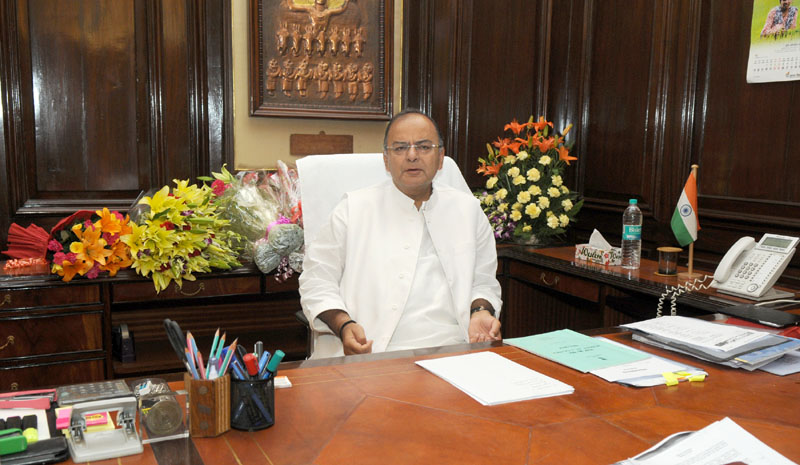‘Jaitley advises CAG not to hype its findings for media attention’, reads a headline in India Today dated 30 October. Yet another headline in The Times of India dated 28 October says, ‘CAG should not report notional losses: PAC chairman Thomas.’ Finance Minister Arun Jaitley and chairman of the Public Accounts Committee (PAC), K V Thomas came out with their opinions during their speech at the bi-annual Accountants' General conference that was held during 27 – 29 October, 2014. The theme of the conference was, ‘Promoting Good Governance and Accountability through Public Audit’.
This is the first biannual AG conference under the leadership of Shashikant Sharma as Comptroller and Auditor General of India (CAG), and a quick review of the CAG website tells you how much has changed since the year 2008. In 2008, during the first AG conference under the leadership of Vinod Rai, the website had carried a visible hyperlink to a microsite on the AG conference. To access the microsite, one didn’t need to be a member of the Indian Accounts and Audit Department and all the four theme papers could be accessed by any visitor.

Shashi Kant Sharma, the CAG of India. Pic: Press Information Bureau
The microsite had also provided access to proceedings through live video streaming. It would certainly be desirable for citizens to be able to view the proceedings and theme papers, just as had been possible in 2008. In sharp contrast however, what we have in public domain so far, courtesy a page on the website titled ‘What’s New’, are transcripts of the speech by the CAG, inaugural speeches by the President and Lok Sabha speaker, and the speech by the PAC chairman.
As on the morning of 30 October, when this article was written, there were only two press releases on that page: the first dated 25 October and second one dated 27 October, the first day of the conference.
Limited information
While inviting the Press Information Bureau-accredited media persons, the office of the CAG had issued a press release on 25 October, giving some details about the agenda of the AG Conference. That press release informed the media that other than the main theme, the conference agenda would include four brainstorming sessions on (i) Emerging Areas of Audit, (ii) Measuring the Impact of Audit, (iii) Capacity Building in IA & AD (Indian Accounts and Audit Department) and (iv) Challenges for A&E (Accounts and Entitlements) offices.
Besides discussions amongst Accountant Generals, Deputy CAGs and Additional Deputy CAGs, the schedule included a panel discussion organised to understand external views on the CAG audit, ‘Reporting for Public Interest: Value and Impact of CAG’s Audit’. The panelists of the session included former cabinet secretary, K M Chandrashekhar; eminent journalist, H K Dua; eminent economist, Bibek Debroy and eminent entrepreneur, Anand Mahindra.
Once again, one wishes that the CAG website would provide citizens a transcript, or at least the highlights, of what these eminent persons said about the working of Supreme Audit Institute of India, and whether they too echoed the same views as expressed by the chairman of the PAC and the Finance Minister. Also, if an eminent entrepreneur can be invited to speak about the value and impact of CAG’s Audit, why not invite an eminent social activist, such as Medha Patkar or Dayamani Barla or C. K. Janu?
The transcript of the speech by the PAC chairman, which is uploaded on the CAG website, cites him as saying: “Nevertheless, I cannot be oblivious to the fact that there is a perception that the CAG audit is fault-finding by nature and sensational by choice. I believe audit has to be based on facts, and if on facts, an act of financial impropriety is seen, it would deserve strongest condemnation. On the other hand, if facts do not directly point out a loss to the exchequer, it would border on transgression to give out astronomically large numbers adding to the sensationalism of media”.
Yet, in the same speech Thomas candidly quoted an astronomically large number himself, when he stated that as on 31 March 2013, there were 11,133 outstanding ‘Action Taken Notes’ in both central and state legislatures. Action Taken Notes submitted by the governments to the PAC, in response to CAG audit findings, are important means of ensuring that necessary corrective action has been taken. Would the PAC chairman please enlighten citizens about the reasons for such a whopping backlog?
Reacting to news reports on the PAC chairman’s suggestion to the CAG not to indulge in reporting ‘notional loss,’ a former Secretary in the Government of India, Ramaswamy Iyer calls it “a constitutional impropriety,” as the Constitution clearly allows the CAG to decide the scope of audit.
Jaitley, on the other hand, reportedly harped on the issue of sensationalising audit findings in his speech, which makes him sound no different from spokespersons of a certain other political party reacting to CAG audit findings on the allocation of 2G spectrum. The minister would have enlightened citizens much better if he were to report the number of hours that our parliamentarians spend on deliberations on the audit findings in CAG audit reports.

Arun Jaitley, Union Minister for Finance. Pic: pib.gov.in
He could have also devoted a sentence or two to dispelling the lack of clarity on what he and other cabinet colleagues are doing about the request to bring about amendments in the CAG (Duties, Powers and Condition of Services) Act, 1971. After all, thanks to Vinod Rai’s book, Not just an Accountant, citizens now know that the Cabinet is yet to take up for discussion the critical proposal that seeks to make it mandatory for the ruling government to table the Audit report in Parliament within a week of receiving it from CAG’s office.
Journalists have quoted Jaitley saying, “Activism and restraint are two sides of the same coin. He (an auditor) must be conscious of the fact that he is reviewing a decision that has already been taken. Has the fair process been followed? He does not have to sensationalise. He does not have to get into headlines.”
Thereafter, there were some more words of wisdom that Jaitley articulated fluently: “If he finds it (the decision) is corrupt, then the level of discretion he exercises in commenting has to be entirely different…We live in a society, which by temperament, having learnt the hard way the last few years, has become an over-suspicious society, and therefore, our job is not to convert public opinion into a kind of a lynch mob”.
The Finance Minister may have forgotten that CAG auditors have now evolved a useful practice of involving the auditee right at the start of a specific audit by Entry Conference, where the scope and methodology is discussed threadbare. Similarly, the draft audit report is shared with the auditee and its replies sought, in addition to which the audit findings also get discussed at the Exit Conference with auditee. How can an audit report that emerges at the end of such a dialogic process be charged with converting “public opinion into a kind of lynch mob”?
It is perhaps time for PIB-accredited senior journalists to start telling us what the CAG auditors discussed during the three days in those four brainstorming sessions, instead of creating sensationalism by reporting the charges of sensationalism voiced by parliamentarians. It is also the need of the hour that the biannual AG conference becomes an opportunity for eminent parliamentarians to listen, rather than use it to grab a few sensational minutes of preaching from the podium.
A nation certainly stands to gain a lot by having a parliament populated by those who listen to CAG auditors rather than lecture them.
























